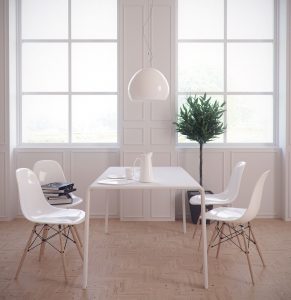 Minimalism is a not a new concept despite the hype the trend has received within the past few years. Minimalism actually originated in the 1950s as an artistic trend and a musical avant-garde movement.
Minimalism is a not a new concept despite the hype the trend has received within the past few years. Minimalism actually originated in the 1950s as an artistic trend and a musical avant-garde movement.
Nowadays, it’s’ best-known for being a concept that allows you to live with less physical belongings and sometimes, even less space. It’s intended to help you feel free and less overwhelmed. What does this have to do with personal finance? A lot actually.
I personally have never considered myself a minimalist because I couldn’t imagine that thought of only having 5 t-shirts on rotation, sleeping on a mattress in the middle of an empty room, and parting with all my kitchen supplies. Of course, this is a dramatized view of minimalism, but for a long time I thought becoming a minimalist required purging 95% of your belongings and questioning the validity of the 10 that are left.
Minimalists come in all different shapes and sizes and as long as you are committed to simplifying your life and freeing yourself from unnecessary possessions, you can take advantage of the financial benefits it provides.
Focus on What you Have Instead of What you Want or Need
Minimalism forces you to shift your mindset from focusing on your next purchase to taking a look around your home to recognize and appreciate what you already have. Most newer minimalists purge items that don’t add any value to their life or just take up space to start the cleansing and decluttering process.
Throwing out or giving away things and letting go is a very empowering action and it will allow you to become more selective and appreciative of what you let into your home and your life. By being grateful for what you have and being content with less, you will ultimately save money by finding other fulfilling habits to partake in aside from shopping and consuming.
You Won’t Need to Earn as Much
Since you won’t need to purchase much in order to add meaning to your life, you can lower your expenses. Some people argue that financial success is attributed to how much you earn, while others feel it’s all about how much you save.
I believe the answer is maintaining a healthy balance between both and keeping your expenses low. There is no sense in earning a lot of money if you spend it all on nonsense. Feeling the pressure to earn more can cause unnecessary stress and an unsettling feeling of never being satisfied. If your expenses are low enough, you will eventually become satisfied with your income since you will have enough to meet your needs and more.
As a minimalist, you can invest your dollars in other aspects of your life that are important like investing and saving.
You’ll Spend More Mindfully
When the time does come to spend money, minimalists know how to spend mindfully. After you’ve adopted frugal habits and are content with having less, you’ll start to question whether you need that extra pair of shoes, decor for your living room, or appliance in your kitchen. You’ll question if obtaining the item will really add value to your life or make you happy in the long run.
Just like you and me, minimalists tend to spend. But they spend mindfully and carefully to avoid wasting money and creating clutter. If you want to start spending mindfully, the next time you go to the store or shop online and consider making a purchase, walk away and take 24 hours to consider why you want to buy ________ and what you will gain long-term if anything from the purchase.
What are your thoughts on minimalism? Would you embrace it to gain more control over your money and your life?
Chonce is a freelance writer who’s obsessed with frugality and passionate about helping others increase their savings rate, eliminate debt, and work toward financial stability. She chronicles her journey to becoming debt-free on her blog, mydebtepiphany.com.